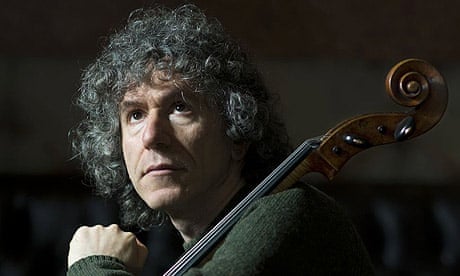Intense times tend to breed intense art. It is hardly surprising that the experience of war should have resulted in some of the most traumatic visual images ever produced, but curiously, music composed during times of war has sometimes seemed to veer away from, rather than reflect, the trauma of world events.
Certainly, much music has been written to celebrate victories (think of Handel's Dettingen Te Deum, for example, written to celebrate Britain's 1743 victory over the French in a major battle – politically incorrect in the extreme, but luckily it doesn't matter after 270 years); and innumerable musical works have graphically depicted and grieved over atrocities.
Wartime fear, also, is illustrated in much music – nowhere more memorably than in the Dona Nobis Pacem section of Beethoven's Missa Solemnis, where a few notes suffice to convey the terror of a population threatened by foreign occupation. But it is the less overtly topical works written in these times, in which composers look inside themselves, rather than outwards, that I find particularly fascinating.
That most dreamy of romantics, Robert Schumann, was forced to take flight with his children and his wife Clara (seven months pregnant at the time) across a field in the middle of the night to escape from revolutionary troops in Dresden in 1849.
Schumann hid deep in the Saxony countryside awaiting the fatal knock at his door from Republican soldiers looking to enlist him. Fortunately, it never came. During this time of dread, strangely, he poured out a series of chamber works, some of the most peaceful, idyllic music that he ever composed.
"It seemed as if the outer storms impelled people to turn inward, and only there did I find a counterforce against the forces breaking in so frightfully from outside," he wrote to a friend from his sanctuary.
The naturally abstract nature of chamber music tends to bring out composers' inner thoughts and feelings, and to allow subtler shades of meaning than more public works. And so it is, with all these juxtapositions and contradictions in mind, as the centenary of the first world war approaches, I have programmed a series of chamber works written "In the Shadow of War" for the Wigmore Hall.
We've confined ourselves to music written in the giant shadows of the two world wars. The series starts on 17 September with the enigmatic cello sonata written between 1913 and 1917 by Frank Bridge, a committed pacifist (a stance he was to pass on to his pupil, Benjamin Britten). The first world war transformed Bridge's life – and his music. You can hear this transformation in the two movements of the sonata: the first an outpouring of lyrical song, the second a dark fantasy full of morbid spectres and aggressive marches, the harmonic language plunging into modernism.
Despair at the chaos of the outer world can also, conversely, drive composers into increased engagement with the art of the past. Both Debussy and Fauré lived to see the horrors of the first world war; but Debussy's Sonata for Flute, Viola and Harp, written in 1915, is imbued with the elegance of the French baroque. Fauré, too, turned away from the chaos surrounding his present to the purity of the ancient Greeks, finding inspiration in their ideals, their lack of unnecessary sensuality for his second violin sonata.
Another composer for whom the past was a muse was Maurice Ravel. In 1914, Ravel raced to finish his Piano Trio before leaving his home to serve in any way he could at the front. (Rejected as a pilot, he ended up working as an ambulance driver.) One might expect his trio to reflect something of that urgency; but no - it is sculpted, polished, and permeated throughout with Ravel's characteristically contained beauty.
In England, Elgar also turned back to the past, but in a less cerebral way. His 1918 Piano Quintet was inspired by some ancient and twisted trees outside his cottage in Sussex, reputed to be the souls of accursed Spanish monks, blasted for their unspeakable practices. Elgar used this legend as an allegory for the madness and loss of war. (His next, and final, completed major work was the cello concerto, another poetic lament for his lost world; towards the end of the concerto, he quotes the ghostly first theme of the quintet.)
Shostakovich, on the other hand, was writing very much in the present tense when he penned his monumental Second Piano Trio in 1944. Shostakovich loathed anti-semitism, and was traumatised by the stories emerging of the concentration camps. He had to mask his feelings, however; overtly pro-Jewish music would presumably have been frowned on in Stalin's Russia, even at that time. So Shostakovich clothed his agonised protest in the guise of a memorial to a recently departed friend, Ivan Sollertinsky, a Jewish polymath fluent in 20 languages, who had been a major influence on Shostakovitch; but one can scarcely miss the wider implications of the music.
We end the four-concert series with a celebrated work from a prisoner-of-war camp, Messiaen's Quator pour la Fin du Temps - the Quartet for the End of Time. This was first performed at the camp in Görlitz to an audience of prisoners and guards, listening in breathless awe. The music is suffused with the sounds of birdsong, fervent worship, mystic angels - an appropriate conclusion to the series, I feel. War's shadow is an infinite one; but within that shadow are infinite shades of light.
* Music in the Shadow of War begins at the Wigmore Hall on 17 September. Further concerts on 1 February, 5 April and 11 July.

Comments (…)
Sign in or create your Guardian account to join the discussion